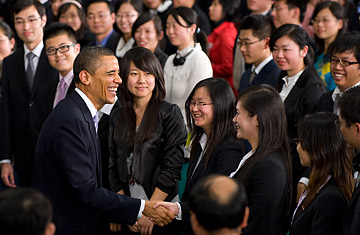
President Obama greets the audience at a town-hall meeting at the Museum of Science and Technology in Shanghai on Nov. 16, 2009
It was a town hall, but this time Barack Obama was not in Iowa or New Hampshire. There were no hay bales, no bunting and no activists with questions about universal health care, clean coal or legalizing marijuana. This forum, after all, was being held in a nation controlled by the Communist Party.
Instead of being greeted by voters mulling their options, Obama on Monday met with several hundred well-dressed, attentive and relentlessly on-message students, handpicked by Chinese authorities for the occasion. They listened attentively, nodding in agreement at some of his answers and laughing at his jokes. Most of their questions were something less than challenging. "What measures will you take to deepen this close relationship between cities of the United States and China?" asked the first questioner, a young woman whom Obama picked randomly from the crowd. "What's the main reason that you were honored with the Nobel Prize for Peace?" asked another. A third followed up on the Nobel Prize line of inquiry. "What's your university/college education that brings you to get such kind of prizes?"
It was the first time a U.S. President had ever hosted a town hall in the Communist Party–controlled state, and the terms of the event were carefully negotiated between diplomats from both countries. The selection of the audience aside, Chinese authorities also picked three questions that had been submitted over the Internet — including one that was sharply critical of U.S. support for the Taiwanese military. U.S. ambassador Jon Huntsman read an additional question, which the White House said had been randomly selected from a group of online submissions acquired by the U.S. government.
Huntsman's question, the most controversial of the night, asked about the "great firewall" that prevents open access to the Internet in China, where many websites are blocked by government censors. "I'm a big supporter of noncensorship," Obama said in a section of the event that was described on the website of Xinhua, the state-run news agency. "This is part of the tradition of the United States."
But the Obama Administration's initial hopes for widespread Chinese broadcast of the event were not, in the end, realized. Though the event was covered on Shanghai television, elsewhere in the country the broadcast networks did not carry the feed. The White House website streamed the video, but it was not immediately apparent that any of the major Chinese Web portals had done the same. A TIME reporter tried to find Chinese residents watching the event in Beijing Internet cafés, but a survey of a half-dozen establishments found no one watching. Customers were playing online games instead.
The frustrations over distribution aside, Obama's message of the importance of communication and mutual respect did seem to strike a chord with the audience at the event. Obama received multiple rounds of applause, and when he spoke of the importance of education for women, many of the young ladies in the audience could be seen nodding their heads in approval.
In an address before taking questions, Obama mentioned the long struggle in the U.S. for equal rights among its citizens, invoking Martin Luther King and Thomas Jefferson to suggest parallels for increased individual rights in China. "We do not seek to impose any system of government on any other nation, but we also don't believe that the principles that we stand for are unique to our nation," Obama said. "These freedoms of expression and worship — of access to information and political participation — we believe are universal rights."
At the end of the event, Obama invited the audience to travel to the U.S. "I think you will find that the American people feel very warmly toward the people of China," Obama said. And then he stepped off the stage, just like in Iowa and New Hampshire, and began shaking hands with the starstruck crowd.
— With reporting by Austin Ramzy and Chengcheng Jiang / Beijing
